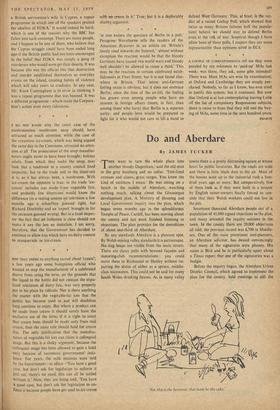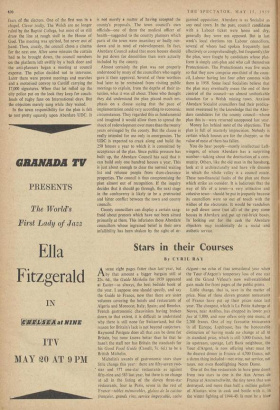Do and Aberdare
By JAMES TUCKER
iTIFIEY want to turn the whole place into
another bloody Dagenham,' said the old man in the grey homburg and no collar. 'Tree-lined avenues and closes; grass verges. You know the kind of nastiness 1 mean.' He was sitting on a bench in the middle of Aberdare, watching nothing much, talking about the Glamorgan development plan. A Ministry of Housing and Local Government inquiry into the plan, which began seven months ago in the splendiferous Temple of Peace. Cardiff, has been moving about the county and last week finished listening to objections. The plan provides for the' demolition of about one-third of Aberdare.
By any standards Aberdare is a pleasant spot. By Welsh mining valley standards it is picturesque. No slag heaps are visible from the main streets. There are classy pubs with beamed facades and motoring-club recommendations: you could move them to Richmond or Henley without im- pairing the status of either as a spruce, middle- class microcosm. This could not be said for many South Wales drinking houses. As in many valley towns there is a pretty distressing square at whose heart lie public lavatories. But the roads are wide and there is little black dust in the air. Most of the houses went up in the industrial rush a hun- dred years ago or more. But comparatively few of them look as if they were built in a temper by English miner-owners finally forced to con- cede that their Welsh workers could not live in the pits.
Seventeen thousand Aberdare people out of a population of 41,000 signed objections to the plan, and many attended the inquiry sessions in the town. In the county there are 20,000 objections all told; the previous record was 6,700 in Middle- sex. One of the most prominent anti-planners, an Aberdare solicitor, has denied convincingly that many of the signatures were phoney. His name is Bird and he is particularly upset about a Times report that one of the signatories was a budgie.
Before the inquiry began, the Aberdare Urban District Council, which agreed to implement the plan for the county, held meetings to still the
'No, this is the beetroot. that mast be the cake.'
fears of the electors. One of the first was in a chapel. Clever really. The Welsh are no longer ruled by the Baptist College, but most of us still draw the line at rough stuff in the House of God. The meeting was spirited, but never out of hand. Then, crazily, the council chose a cinema for the next one. After some minutes the curtain had to be brought down, the council members on the platform left swiftly by a back door and the anti-planners began a meeting at council expense. The police decided not to intervene. Later there were protest meetings and marches and a motorised convoy to Cardiff carrying the 17,000 signatures. When that lot rolled up the city police put on the look they keep for coach- loads of rugby fans on International days. But the objectors merely sang while they waited.
In the town responsibility for the plan is felt to rest pretty squarely upon Aberdare UDC. It is not merely a matter of having accepted the county's proposals. The town council's own officials—one of them the medical officer of health—suggested to the country planners which parts of the town were insanitary or badly run- down and in need of redevelopment. In fact, Aberdare Council asked that more houses should be put down for demolition than were actually included by the county.
Almost certainly the plan was not properly understood by many of the councillors who sagely gave it their approval. Several of these worthies had later to be restrained from visiting public meetings to explain, from the depths of their in- tuition, what it was all about. Those who thought they did understand the plan placed much em- phasis on a clause saying that the pace of implementation could vary according to economic circumstances. They regarded this as fundamental and imagined it would allow them to spread the shock of redevelopment over more than the twenty years envisaged by the county. But the clause is really intended for use only in emergencies. The UDC is expected to crack along and build the 250 houses a year to which it is committed by acceptance of the plan. Since public pressure has built up, the Aberdare Council has said that it can build only one hundred houses a year. This is just about enough to clear the normal waiting list and rehouse people from slum-clearance properties. The council is thus compromising the plan almost out of recognition. If the inquiry decides that it should go through, the next stage in the controversy is likely to be a protracted and bitter conflict between the town and county councils.
County councillors can display a certain sang- froid about protests which have not been aimed primarily at them. This infuriates those Aberdare councillors whose ingrained belief in their own infallibility has been shaken by the sight of or- ganised opposition. Aberdare is as Socialist as any coal town. In the past, council candidates with a Labour ticket were home and dry; generally they were not opposed. But in last week's local elections ten Labour councillors, several of whom had spoken frequently (not effectively or comprehendingly, but frequently) for the plan, were fought by candidates whose plat- form is simply anti-plan and who call themselves Protectionists. The Protectionists won five seats so that they now comprise one-third of the coun- cil, Labour having lost four other contests with them in 1958. Some local Socialists believe that the plan may eventually mean the end of their control of the council—an almost unthinkable situation for a Welsh mining town. Anxious Aberdare Socialist councillors find their predica- ment sweetened by the knowledge that the Aber- dare candidates for the county council—whose plan this is—were returned unopposed last year.
Money lies behind most of the objections. The plan is full of masterly imprecision. Nobody is certain which houses are for the chopper, so the value of most of them has fallen.
You do hear people—mostly intellectual Left- wingers, of whom Aberdare has a surprising number—talking about the destruction of a com- munity. Others, like the old man in the homburg. look at it architecturally and have vile dreams in which the whole valley is a council estate. These non-financial faults of the plan are those which strike an outsider. It is ludicrous that the way of life of a town—a very attractive and cohesive town—should be put in jeopardy because its councillors were so out of touch with the wishes of the electorate. It would be vandalism to pull down some (not all) of the grey stone houses in Aberdare and put up red-brick boxes. in looking out for the cash the Aberdare objectors may incidentally do a social and aesthetic service.



































 Previous page
Previous page